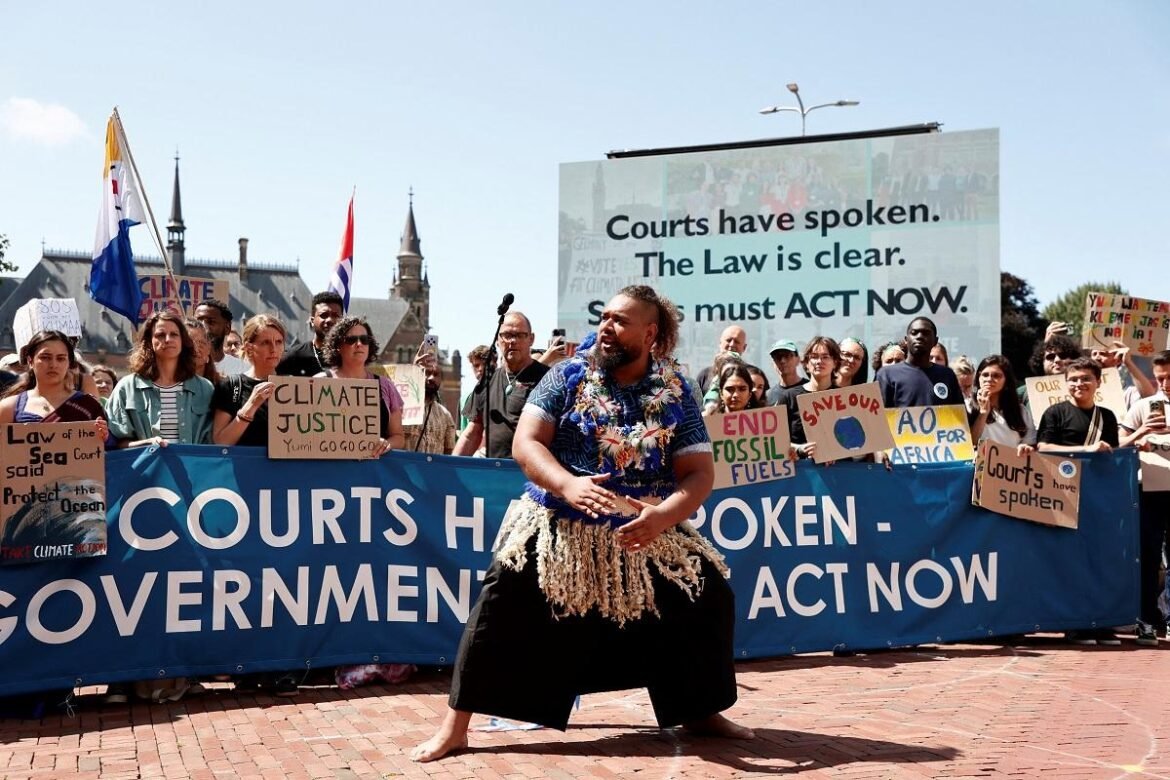THE HAGUE — The United Nations’ highest court docket on Wednesday underlined “the pressing and existential menace posed by local weather change” because it began to learn out an opinion on the legal obligations of states to take motion.
The non-binding opinion by the Worldwide Courtroom of Justice, also referred to as the World Courtroom, is prone to decide the course of future local weather motion the world over.
“Greenhouse fuel emissions are unequivocally attributable to human actions which aren’t territorially restricted,” decide Yuji Iwasawa stated. The studying of the opinion was ongoing and the court docket had not but introduced its conclusions.
Forward of the ruling, supporters of local weather motion gathered outdoors the ICJ, chanting: “What do we wish? Local weather justice! When do we wish it? Now!”
Though it’s non-binding, the deliberation of the 15 judges of the ICJ in The Hague will nonetheless carry authorized and political weight and future local weather circumstances could be unable to disregard it, authorized specialists say.
“It’s so essential, it may very well be probably the most consequential authorized rulings of our instances due to the scope of the problems that it touches, which run to the very coronary heart of local weather justice,” stated Joie Chowdhury, senior lawyer on the Middle for Worldwide Environmental Regulation.
The 2 questions the UN Normal Meeting requested the judges to contemplate have been: what are international locations’ obligations underneath worldwide regulation to guard the local weather from greenhouse fuel emissions; and what are the authorized penalties for international locations that hurt the local weather system?
In two weeks of hearings final December on the ICJ, rich international locations of the World North advised the judges that current local weather treaties, together with the 2015 Paris Settlement, that are largely non-binding, needs to be the idea for deciding their duties.
Creating nations and small island states argued for stronger measures, in some circumstances legally binding, to curb emissions and for the largest emitters of climate-warming greenhouse gases to supply monetary assist.
Paris Settlement
In 2015, on the conclusion of UN talks in Paris, greater than 190 international locations dedicated to pursue efforts to restrict international warming to 1.5 levels Celsius (2.7 levels Fahrenheit).
The settlement has did not curb the expansion of world greenhouse fuel emissions.
Late final 12 months, in the latest “Emissions Hole Report,” which takes inventory of nations’ guarantees to sort out local weather change in contrast with what is required, the UN stated that present local weather insurance policies will lead to international warming of greater than 3°C (5.4°F) above pre-industrial ranges by 2100.
As campaigners search to carry corporations and governments to account, local weather?associated litigation has intensified, with practically 3,000 circumstances filed throughout virtually 60 international locations, in line with June figures from London’s Grantham Analysis Institute on Local weather Change and the Atmosphere.
Thus far, the outcomes have been combined.
A German court docket in Might threw out a case between a Peruvian farmer and German vitality big RWE, however his attorneys and environmentalists stated the case, which dragged on for a decade, was nonetheless a victory for local weather circumstances that might spur comparable lawsuits.
Earlier this month, the Inter-American Courtroom of Human Rights, which holds jurisdiction over 20 Latin American and Caribbean international locations, stated in one other advisory opinion its members should cooperate to sort out local weather change.
Campaigners say Wednesday’s court docket opinion needs to be a turning level, even when the ruling itself is advisory.
The ruling might additionally make it simpler for states to carry different states to account over local weather points like air pollution or emissions.
“The court docket can affirm that local weather inaction, particularly by main emitters, just isn’t merely a coverage failure however a breach of worldwide regulation,” stated Fijian Vishal Prasad, one of many regulation college students that lobbied the federal government of Vanuatu within the South Pacific Ocean to carry the case to the ICJ.
Though it’s theoretically doable to disregard an ICJ ruling, attorneys say international locations are sometimes reluctant to take action.
“This opinion is making use of binding worldwide regulation, which international locations have already dedicated to,” Chowdhury stated. — Reuters


